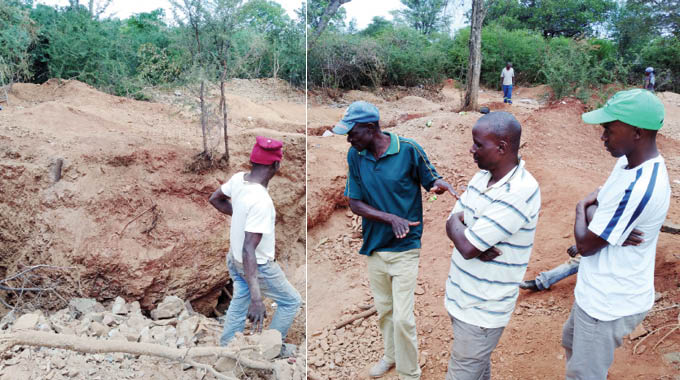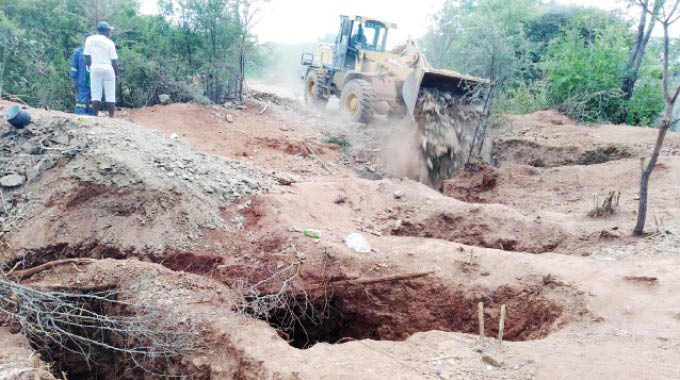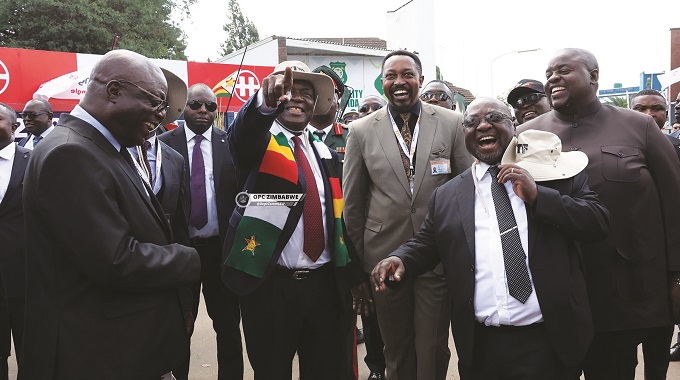Communities endure poverty amidst gold’s glitter: the case of gold smuggling and porous borders in Zimbabwe

Andile Tshuma
THERE are more holes than there is level ground along the banks of UMzingwane river in Esigodini, Matabeleland South Province. Livestock big and small—goats, sheep, cattle and donkeys—have fallen into these man-made dungeons. The holes are dug by artisanal miners, most of them mining illegally.
According to the Zimbabwe Geological Survey, the gold-rich lands in this area contribute some 40 percent of Zimbabwe’s gold. Yet the Ministry of Mines and Mining development says less than a third of this reaches the central bank. Instead a well-oiled syndicate is reported to operate in the area, buying gold at a premium, at better rates than those offered by the country’s sole gold buyer, Fidelity Printers and Refiners.
Despite such rich gold reserves in their backyards, many locals here live in abject poverty. Traditional chiefs are now calling for government to introduce policies that compel miners to contribute to community development funds, giving back to the land that gives them gold.
“We are living in such extreme poverty yet…we are literally walking on fortunes. We have lost our pastures; we have lost our fields. They come here and dig wherever they wish. The children have lost their playground. It is no longer safe,” said Chief Nyangazonke of Kezi.
Zimbabwe last year produced an all-time high record of 33 tonnes of gold, surpassing the 1999 peak record of 27 tonnes and earning US$1,6 billion in forex. But the country’s gold deliveries fell by 30 percent to 12,3 tonnes in the first six months of 2019, from 17,3 tonnes during the same period last year, due to suspected smuggling and power shortages.
It comes at a time when the reduction of forex retention levels to small scale miners to 55 percent from 70 percent has created arbitrage opportunities for smugglers.
Fidelity Printers and Refinery (FPR) pays miners a rate tied to international gold prices, but now only 55 percent of that is paid in US dollars, while the rest is paid in far less valuable RTGS dollars — at the official interbank rate, which is constantly depreciating.

Umzingwane RDC trucks fills pits left by panners
Most of the local villagers have little, and one of the only job opportunities available to them is selling foodstuffs to the miners. Not only have mining activities left the local villagers poorer, but communities report rising levels of violence since the miners began working there. Territorial wars are the order of the day as the bosses wrestle over turf.
Last year in October, a man was murdered weeks before his wedding day, after attempting to protect his girlfriend from drunk miners.
Amid the violence and the poverty that now characterises Esigodini and Filabusi communities, locals say a particular cartel is enriching itself at the expense of locals and the generality of Zimbabweans, smuggling tonnes of gold to neighbouring countries, primarily South Africa.
Cases of gold smuggling at the Beitbridge and Plumtree Border posts are ongoing, as evidenced by the regular seizures of the yellow metal recorded by police.
The Zimbabwe Republic Police Minerals, Flora and Fauna Unit has helped to bring to book some notorious smugglers, most of whom have been arrested at the country’s Beitbridge and Plumtree border posts.
National police spokesperson assistant commissioner Paul Nyathi said the unit has this year recovered exhibits worth 28,9kg of gold on its patrols.
“[They] were handed over to Fidelity Printers,” Nyathi said. “The ZRP is working together with other stakeholders who include the mines ministry to ensure that patrols are conducted in key areas. We are also deploying police officers at ports of exit and entry to ensure that no smuggling takes place.”
In 2016, a 33-year-old man was found in possession of 11 kg of gold worth nearly half a million United States dollars at Plumtree Border Post. Last year another man was arrested while trying to smuggle 28,5 kg of gold valued at about US$970,000 into Botswana. Weeks later, five cases of individuals attempting to smuggle gold whose value ranged from US$200,000 to US$500,000 were reported at the same border post.
While police deserve credit for vigilance in bringing some of the criminals to book, the smuggling scourge worsens, becoming increasingly coordinated and sophisticated as the cases brought before the courts have shown.
Last month, the High Court dismissed an application for leave to appeal to the Supreme Court by nine suspects, including police officers and a magistrate, allegedly involved in the theft of nearly $1 million worth of gold which was being kept as an exhibit at Plumtree Police Station.
While addressing journalists recently, Acting Prosecutor General Kumbirai Hodzi spoke against corruption in the justice delivery system and said he was aware of an unnamed criminal syndicate comprising of top magistrates, prosecutors, police officers and immigration officers who systematically conduct corrupt activities, including smuggling the country’s resources. The alleged syndicate has since appeared in court facing various charges including fraud, smuggling, theft of trust property and criminal abuse of office. The case is ongoing.
The Chronicle caught up with one of the alleged leaders of a different cartel, a notorious gold baron who narrated their operations on the condition of anonymity.
“We are untouchable,” he said. “I have a team of 30 men who buy gold for me from the miners. I also have a prospector’s licence. I sell some gold to RBZ to keep things legit, but the real money is in the underworld. That is where the money is. People fear me but I also have my bosses. We take the gold to South Africa. The border is not a problem we have guys on our payroll. We are not stealing from anyone. We are digging the ground, getting metal and selling it where we are offered the best rates,” he said.
Mining experts believe that Zimbabwe’s gold target of 40 tonnes will not be reached by the end of 2019, given the subdued prices and low forex retention levels.
Of the 12,3 tonnes delivered to Fidelity this year, 7,3 tonnes came from small scale producers and 5 tonnes from primary producers.
Experts believe that if the government ceased paying small scale miners predominately in local currency, the 100 tonnes mark would be reached by 2020. The 45 percent paid in RTGS dollars means the miners end up being paid less than the international gold prices.
The Deputy Minister of Mines and Mining development Cde Polite Kambamura has called for miners to shun corruption and protect the country’s mineral resources.
“We are working together with Fidelity Printers and Refiners to establish what exactly is happening on the ground. Thereafter, we will come with policy intervention and a cocktail of other responsive measures so as to contain this adverse situation. Mineral resources must benefit our country, and everyone should play a part,” he said.
But for now, small scale miners who spoke to this publication said they preferred trading in the parallel market as it offered them more value for their toil.
“This story was produced by the Chronicle. It was written as part of Wealth of Nations, a media skills development programme run by the Thomson Reuters Foundation.. More information at www.wealth-of-nations.org. The content is the sole responsibility of the author and the publisher.”










Comments